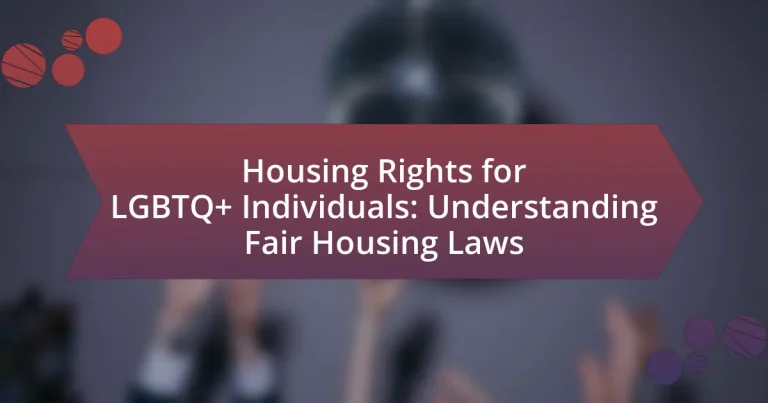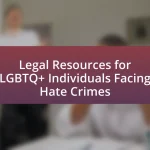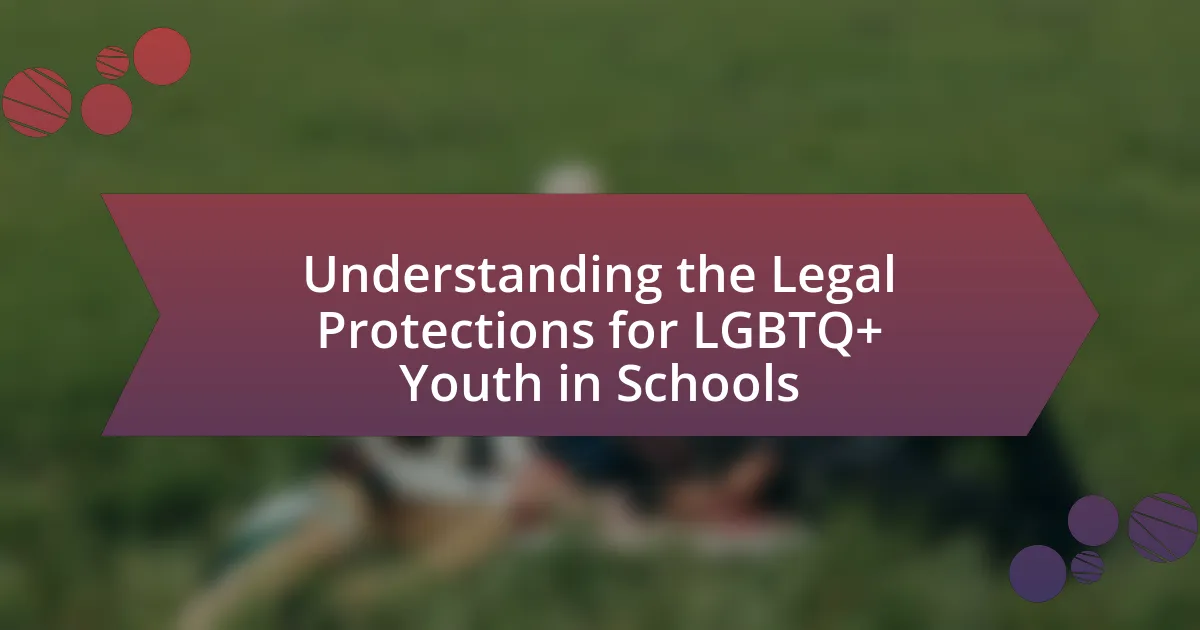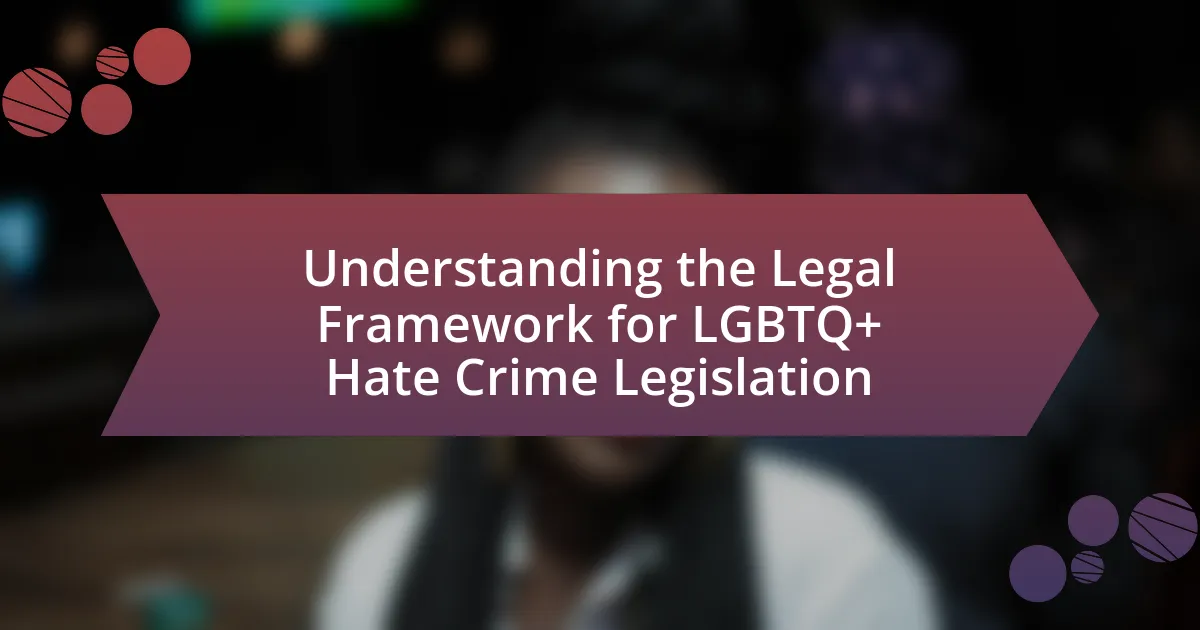Housing rights for LGBTQ+ individuals are essential protections against discrimination based on sexual orientation and gender identity, as outlined by the Fair Housing Act and reinforced by various court rulings, including the landmark 2020 Supreme Court decision in Bostock v. Clayton County. The article explores the significance of these rights in ensuring safe and stable living environments, the historical context that has shaped current protections, and the various forms of discrimination faced by LGBTQ+ individuals in housing. It also discusses the legal recourse available for those experiencing discrimination, the role of community organizations in advocating for housing rights, and best practices for landlords to create inclusive environments. Additionally, the article highlights the importance of education and awareness in empowering LGBTQ+ individuals to assert their housing rights effectively.

What are Housing Rights for LGBTQ+ Individuals?
Housing rights for LGBTQ+ individuals encompass protections against discrimination in housing based on sexual orientation and gender identity. The Fair Housing Act, enacted in 1968, prohibits discrimination in housing-related activities, and various court rulings and administrative decisions have interpreted this to include protections for LGBTQ+ individuals. For instance, in 2020, the U.S. Supreme Court ruled in Bostock v. Clayton County that discrimination based on sexual orientation or gender identity constitutes sex discrimination under Title VII of the Civil Rights Act, which has implications for housing rights as well. Additionally, many states and local jurisdictions have enacted specific laws that further protect LGBTQ+ individuals from housing discrimination, reinforcing their rights to secure housing without facing bias.
Why are housing rights important for LGBTQ+ individuals?
Housing rights are crucial for LGBTQ+ individuals because they ensure protection against discrimination and provide access to safe and stable living environments. Discrimination in housing can lead to homelessness, instability, and mental health issues within the LGBTQ+ community. According to the 2021 U.S. Transgender Survey, 30% of respondents experienced housing discrimination, highlighting the urgent need for legal protections. Ensuring housing rights helps to foster equality, security, and dignity for LGBTQ+ individuals, allowing them to live without fear of being denied housing based on their sexual orientation or gender identity.
What historical context shapes the current housing rights landscape for LGBTQ+ individuals?
The historical context that shapes the current housing rights landscape for LGBTQ+ individuals includes the systemic discrimination faced by this community, particularly during the mid-20th century. The Stonewall Riots of 1969 marked a pivotal moment in LGBTQ+ activism, leading to increased visibility and advocacy for rights, including housing. In 1988, the Fair Housing Amendments Act was passed, which prohibited discrimination based on sexual orientation and gender identity in housing, although enforcement varied by state. Additionally, the 2015 Supreme Court ruling in Obergefell v. Hodges legalized same-sex marriage, further influencing housing rights by recognizing the legitimacy of same-sex couples in legal contexts. These historical events collectively contributed to the ongoing struggle for equitable housing rights for LGBTQ+ individuals, highlighting the importance of legal protections against discrimination.
How do housing rights impact the overall well-being of LGBTQ+ individuals?
Housing rights significantly enhance the overall well-being of LGBTQ+ individuals by providing them with security, stability, and a sense of belonging. Access to safe and affirming housing reduces the risk of homelessness, which disproportionately affects LGBTQ+ populations; studies indicate that LGBTQ+ youth are 120% more likely to experience homelessness compared to their heterosexual peers. Furthermore, legal protections against discrimination in housing foster mental health and community integration, as individuals feel valued and accepted in their living environments. Research from the Williams Institute shows that inclusive housing policies lead to improved mental health outcomes and lower rates of anxiety and depression among LGBTQ+ individuals. Thus, robust housing rights are essential for promoting the dignity and quality of life for LGBTQ+ communities.
What are the key components of fair housing laws?
The key components of fair housing laws include the prohibition of discrimination based on race, color, national origin, religion, sex, familial status, and disability. These laws, primarily established by the Fair Housing Act of 1968, aim to ensure equal access to housing opportunities for all individuals. Additionally, many states and local jurisdictions have expanded these protections to include sexual orientation and gender identity, further safeguarding the rights of LGBTQ+ individuals in housing matters. The enforcement of these laws is supported by various federal agencies, including the Department of Housing and Urban Development (HUD), which investigates complaints and promotes fair housing practices.
What specific protections do fair housing laws provide for LGBTQ+ individuals?
Fair housing laws provide specific protections for LGBTQ+ individuals by prohibiting discrimination based on sexual orientation and gender identity in housing-related activities. The Fair Housing Act, as interpreted by the U.S. Department of Housing and Urban Development (HUD), includes these protections, ensuring that LGBTQ+ individuals cannot be denied housing, face unequal terms, or be subjected to harassment due to their sexual orientation or gender identity. This interpretation is supported by various court rulings and HUD’s enforcement actions, which affirm that discrimination against LGBTQ+ individuals in housing is a violation of federal law.
How do these laws differ across various states and localities?
Laws regarding housing rights for LGBTQ+ individuals differ significantly across various states and localities, with some states offering comprehensive protections while others provide minimal or no protections. For instance, states like California and New York have robust anti-discrimination laws that explicitly include sexual orientation and gender identity, ensuring that LGBTQ+ individuals cannot be denied housing based on these characteristics. In contrast, states such as Alabama and Mississippi lack statewide protections, allowing for potential discrimination against LGBTQ+ individuals in housing. Additionally, local ordinances may further vary; cities like Chicago and San Francisco have enacted their own laws that enhance protections beyond state mandates, demonstrating a patchwork of legal frameworks that can lead to unequal treatment based on geographic location.
How can LGBTQ+ individuals advocate for their housing rights?
LGBTQ+ individuals can advocate for their housing rights by educating themselves about fair housing laws and actively participating in local advocacy groups. Understanding the Fair Housing Act, which prohibits discrimination based on sexual orientation and gender identity in housing, empowers individuals to recognize their rights. Engaging with organizations such as the Human Rights Campaign or local LGBTQ+ centers provides resources and support for navigating housing issues. Additionally, reporting discrimination to the Department of Housing and Urban Development (HUD) can lead to investigations and potential legal action, reinforcing the importance of holding landlords accountable.
What resources are available for LGBTQ+ individuals facing housing discrimination?
LGBTQ+ individuals facing housing discrimination can access various resources, including legal assistance, advocacy organizations, and government agencies. Legal assistance can be obtained from organizations like the Lambda Legal Defense and Education Fund, which provides legal representation and resources specifically for LGBTQ+ rights. Advocacy organizations such as the Human Rights Campaign offer support and information on housing rights, while the U.S. Department of Housing and Urban Development (HUD) enforces fair housing laws that protect against discrimination based on sexual orientation and gender identity. Additionally, local LGBTQ+ community centers often provide resources and referrals for individuals facing housing issues.
How can community organizations support housing rights for LGBTQ+ individuals?
Community organizations can support housing rights for LGBTQ+ individuals by providing legal assistance, advocacy, and education on fair housing laws. These organizations often offer resources that help individuals understand their rights under the Fair Housing Act, which prohibits discrimination based on sexual orientation and gender identity. For instance, the National Fair Housing Alliance reports that LGBTQ+ individuals face higher rates of discrimination in housing, highlighting the need for targeted support. By facilitating workshops, distributing informational materials, and connecting individuals with legal aid, community organizations empower LGBTQ+ individuals to assert their rights and seek justice in housing matters.

What forms of discrimination do LGBTQ+ individuals face in housing?
LGBTQ+ individuals face various forms of discrimination in housing, including denial of rental applications, unfair eviction practices, and harassment from landlords or neighbors. Studies indicate that LGBTQ+ individuals, particularly transgender and non-binary people, experience higher rates of discrimination compared to their heterosexual counterparts. For instance, a 2021 survey by the National Fair Housing Alliance found that 22% of LGBTQ+ individuals reported experiencing discrimination when seeking housing. This discrimination can manifest through biased treatment based on sexual orientation or gender identity, leading to significant barriers in accessing safe and affordable housing.
How does discrimination manifest in the housing market?
Discrimination in the housing market manifests through practices such as denial of rental applications, unequal treatment in housing services, and steering individuals toward or away from certain neighborhoods based on their sexual orientation or gender identity. For instance, a study by the National Fair Housing Alliance found that LGBTQ+ individuals often face higher rates of rejection when applying for housing compared to heterosexual applicants. Additionally, landlords may impose different rental terms or conditions based on an applicant’s LGBTQ+ status, violating the Fair Housing Act, which prohibits discrimination based on sex, among other factors. These discriminatory practices contribute to systemic inequalities in housing access for LGBTQ+ individuals.
What are common examples of discriminatory practices against LGBTQ+ individuals?
Common examples of discriminatory practices against LGBTQ+ individuals include denial of housing, eviction based on sexual orientation or gender identity, and refusal to rent or sell property. These practices violate fair housing laws, such as the Fair Housing Act in the United States, which prohibits discrimination based on sex, among other categories. Studies indicate that LGBTQ+ individuals face higher rates of discrimination in housing compared to heterosexual individuals, with reports showing that 19% of LGBTQ+ individuals experienced discrimination when seeking housing.
How can individuals identify and report housing discrimination?
Individuals can identify housing discrimination by recognizing unfair treatment based on race, color, national origin, religion, sex, familial status, or disability, as outlined by the Fair Housing Act. Signs of discrimination include being denied housing, receiving different rental terms, or being subjected to harassment. To report housing discrimination, individuals should document incidents, gather evidence such as emails or witness statements, and file a complaint with the U.S. Department of Housing and Urban Development (HUD) or a local fair housing agency. HUD investigates complaints and enforces fair housing laws, providing a structured process for addressing discrimination.
What legal recourse is available for LGBTQ+ individuals facing discrimination?
LGBTQ+ individuals facing discrimination have several legal recourses available, primarily through federal, state, and local anti-discrimination laws. The Fair Housing Act prohibits discrimination based on sex, which has been interpreted by courts to include sexual orientation and gender identity, allowing individuals to file complaints with the Department of Housing and Urban Development (HUD). Additionally, many states and municipalities have enacted their own laws that explicitly protect LGBTQ+ individuals from housing discrimination, providing avenues for legal action through state agencies or civil lawsuits. For instance, the 2020 Supreme Court ruling in Bostock v. Clayton County affirmed that discrimination based on sexual orientation or gender identity is a form of sex discrimination under Title VII of the Civil Rights Act, reinforcing protections for LGBTQ+ individuals in various contexts, including housing.
What steps should individuals take if they believe their rights have been violated?
Individuals who believe their rights have been violated should first document the incident thoroughly, including dates, times, locations, and any witnesses. This documentation serves as crucial evidence. Next, individuals should report the violation to the appropriate authorities, such as the local housing agency or the U.S. Department of Housing and Urban Development (HUD), which enforces fair housing laws. Filing a formal complaint with these agencies initiates an investigation into the alleged violation. Additionally, individuals may seek legal advice from organizations specializing in civil rights or housing discrimination, such as the National Fair Housing Alliance, to understand their options and rights. Engaging with advocacy groups can also provide support and resources for navigating the complaint process.
How effective are legal actions in addressing housing discrimination?
Legal actions are effective in addressing housing discrimination, particularly for LGBTQ+ individuals, as they provide a formal mechanism to challenge discriminatory practices. The Fair Housing Act prohibits discrimination based on sexual orientation and gender identity, allowing affected individuals to file complaints with the Department of Housing and Urban Development (HUD) or pursue lawsuits. Statistics indicate that legal actions have led to significant settlements and changes in policies, with HUD reporting over 1,000 investigations related to LGBTQ+ discrimination in recent years. These actions not only provide remedies for victims but also promote awareness and compliance among housing providers, thereby contributing to a more equitable housing market.

What are the best practices for ensuring fair housing for LGBTQ+ individuals?
The best practices for ensuring fair housing for LGBTQ+ individuals include implementing inclusive non-discrimination policies, providing training for housing providers on LGBTQ+ issues, and promoting awareness of LGBTQ+ rights. Inclusive non-discrimination policies should explicitly prohibit discrimination based on sexual orientation and gender identity, as supported by the Fair Housing Act, which has been interpreted to protect LGBTQ+ individuals. Training for housing providers can help reduce bias and improve interactions with LGBTQ+ tenants, fostering a more equitable housing environment. Additionally, raising awareness through community outreach and education can empower LGBTQ+ individuals to understand their rights and report discrimination, thereby enhancing their access to fair housing.
How can landlords and property managers create inclusive environments?
Landlords and property managers can create inclusive environments by implementing policies that actively promote diversity and prohibit discrimination based on sexual orientation and gender identity. This can be achieved by providing training for staff on LGBTQ+ issues, ensuring that marketing materials reflect diverse communities, and establishing clear anti-discrimination policies that comply with fair housing laws, such as the Fair Housing Act, which prohibits discrimination in housing based on race, color, national origin, religion, sex, familial status, or disability, and has been interpreted to include sexual orientation and gender identity in many jurisdictions. Additionally, creating safe spaces for LGBTQ+ individuals, such as gender-neutral restrooms, and fostering a community culture that values inclusivity can further enhance the living experience for all tenants.
What training and policies should be implemented to prevent discrimination?
To prevent discrimination in housing for LGBTQ+ individuals, comprehensive training on fair housing laws and implicit bias should be implemented alongside clear anti-discrimination policies. Training programs must educate housing providers, real estate agents, and property managers about the specific protections afforded to LGBTQ+ individuals under the Fair Housing Act, which prohibits discrimination based on sexual orientation and gender identity. Additionally, policies should include strict reporting mechanisms for discrimination complaints, regular audits of housing practices, and mandatory diversity and inclusion training to foster an understanding of LGBTQ+ issues. Research indicates that organizations with robust training and clear policies experience a significant reduction in discriminatory practices, thereby promoting equitable housing opportunities for all individuals.
How can community awareness be raised about LGBTQ+ housing rights?
Community awareness about LGBTQ+ housing rights can be raised through targeted educational campaigns and community engagement initiatives. These efforts can include workshops, informational sessions, and partnerships with local organizations that focus on LGBTQ+ advocacy and housing rights. For instance, the National Fair Housing Alliance reports that educating the public about fair housing laws can significantly reduce discrimination and increase awareness of rights. Additionally, utilizing social media platforms to share personal stories and resources can further amplify the message and reach a broader audience.
What practical steps can LGBTQ+ individuals take to protect their housing rights?
LGBTQ+ individuals can protect their housing rights by understanding and asserting their rights under fair housing laws. They should familiarize themselves with the Fair Housing Act, which prohibits discrimination based on sexual orientation and gender identity in housing. Additionally, LGBTQ+ individuals can document any discriminatory incidents, seek legal assistance from organizations like the National LGBTQ Task Force, and file complaints with the U.S. Department of Housing and Urban Development (HUD) if they experience discrimination. Research indicates that LGBTQ+ individuals face higher rates of housing discrimination, making awareness and proactive measures essential for safeguarding their rights.
How can individuals educate themselves about their rights and available resources?
Individuals can educate themselves about their rights and available resources by accessing legal aid organizations, government websites, and community advocacy groups focused on housing rights. For instance, the U.S. Department of Housing and Urban Development (HUD) provides comprehensive information on fair housing laws, including protections for LGBTQ+ individuals. Additionally, organizations like the National LGBTQ Task Force and Lambda Legal offer resources, guides, and legal assistance specifically tailored to the needs of LGBTQ+ individuals facing housing discrimination. Engaging with these resources ensures individuals are informed about their rights and the support available to them.
What strategies can be employed to navigate housing challenges effectively?
To navigate housing challenges effectively, individuals can employ strategies such as understanding their rights under fair housing laws, seeking legal assistance, and utilizing community resources. Familiarity with the Fair Housing Act, which prohibits discrimination based on sexual orientation and gender identity, empowers individuals to advocate for themselves. Legal assistance from organizations like the National LGBTQ Task Force can provide guidance and support in cases of discrimination. Additionally, connecting with local LGBTQ+ community centers can offer resources, housing referrals, and support networks that help individuals find safe and affirming housing options. These strategies are validated by the ongoing efforts of advocacy groups that work to ensure equitable housing access for LGBTQ+ individuals.





